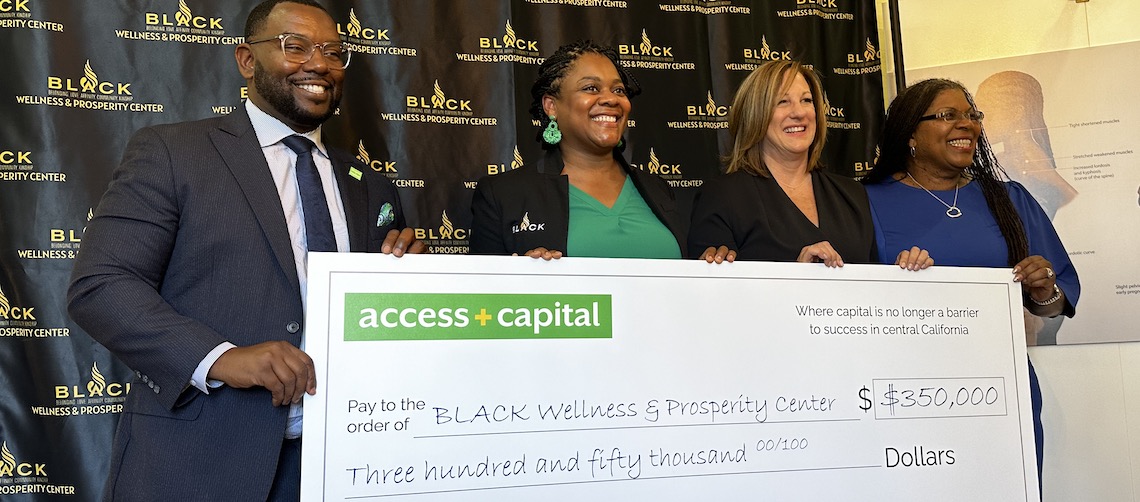
From left, Tate Hill, Shantay Davies-Balch, Pamela Mostert and Tara Lynn Gray participate in a check ceremony for the Black Wellness & Prosperity Center. Photo by Estela Anahi Jaramillo
Written by Estela Anahi Jaramillo
Fresno-based Access Plus Capital has launched a new contract financing program aimed at empowering small business growth.
Contract financing bridges the gap between securing a government contract and fulfilling its requirements. It provides small businesses with the upfront working capital needed to purchase supplies, hire staff and cover operational costs associated with the contract.
This is particularly crucial for small businesses in Central California, where a vibrant entrepreneurial spirit often faces challenges accessing traditional funding sources.
“Contract financing unlocks tremendous potential for small businesses in Central California,” said Tate Hill, president and CEO of Access Plus Capital. “By providing essential working capital, we empower small businesses to pursue government contracts, fostering economic growth and job creation within the region.”
This loan is specifically designed to support small businesses and nonprofit organizations awarded contracts at reimbursement terms.
Contract financing offers businesses immediate funding based on expected contract revenue, enhancing cash flow management. One method, invoice factoring, functions like a short-term loan, allowing businesses to start new projects without waiting for previous ones to pay out and maintain steady operations. Various types of contract financing ensure businesses have immediate access to capital for essential expenses, mitigating the impact of delayed payments.
Hill explained this program as not just a financial solution but a lifeline that will enable these entities to fulfill their contract and continue their essential work within the community.
Support from the State Small Business Credit Initiative (SSBCI) has allowed the program to offer contract financing as an equitable financing tool that ensures that small businesses and nonprofits have the resources they need to succeed.
The SSBCI allows APC to provide not only capital with the support of a loan guarantee but also technical assistance or business coaching, which is critical to navigating the complexities of contract fulfillment.
Hill said that offering contract financing empowers businesses and nonprofits to overcome financial barriers.
“Our commitment to equitable access to financing is unwavering. That’s what we’re all about. We believe that every entrepreneur, every nonprofit, regardless of their background or the size of their operation, deserves a chance to succeed,” said Hill. “Contract financing is a testament to that belief. And we are incredibly proud to bring this product to you and our business community.”
Through iBank, a state financial institution that provides the trustee of funds, Access Plus Capital can take on a little more risk and do the loans that traditional lenders tend to shy away from. Chief Operating Officer Pamela Mostert said they provide a guarantee program, which means they protect Access Plus Capital as the lender and guarantee 80% of that loan. The risk exposure is about 20%, not only through the state guarantee program but through programs like Cal Cap.
Access Plus Capital’s first contracting loan went to BLACK Wellness & Prosperity Center (BWPC) for $350,000.
“We are proud to partner with Access Plus Capital to achieve our mission of improving health outcomes for every Black mama and birthing person in our community,” said Shantay R. Davies-Balch, CEO & President of BWPC. “This event fosters collaboration and empowers small businesses and nonprofits alike to navigate the opportunities presented by government contracts.”
Davies-Balch shared how they heavily engage with government entities as a nonprofit organization. With most government contracts being reimbursable, they have to expend the funds first upfront and then read through a large file to ensure that the expenses are allowable and justifiable.
A lot of times, a nonprofit operates programmatic funds rather than operational capital. This can stymie the organization’s ability to provide services to support staff growth, retention, salaries and overall cash flow.
“This product is a lifeline for nonprofit organizations working primarily from a reimbursable standpoint,” said Davies-Balch. “To provide a little perspective on where we are right now as an organization, we currently have about $480,000 of outstanding payables that were our receivables that we are waiting on from our government partners. So while we are very excited about those partnerships, this work that we do wouldn’t be possible.”
Tara Lynn Gray, director of the California Office of the Small Business Advocate (CalOSBA), shared that because California is committed to a 25% small business participation rate, contracts with state agencies are a significant market opportunity.
“We believe in supporting that opportunity with innovative capital solutions like contract financing. CalOSBA is proud that our SCALE network of small business centers supports small businesses to access the capital they need and contribute to the economic vitality of our communities,” she said.








